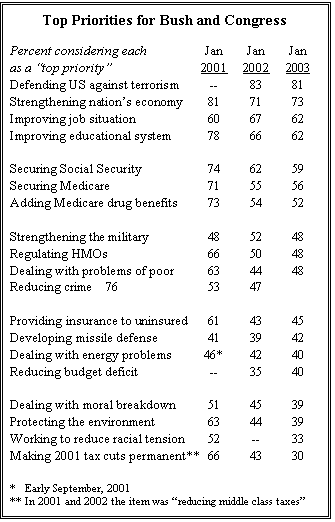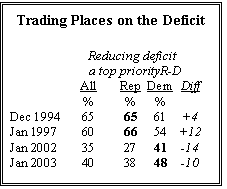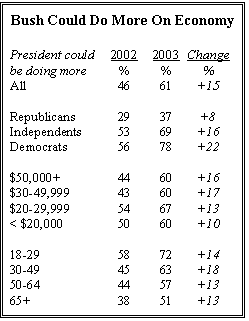Summary of Findings
As President Bush prepares for his Jan. 28 State of the Union address, the public’s mood is more subdued that it was a year ago, especially regarding the nation’s struggling economy. Just three-in-ten say they expect economic conditions to improve over the next 12 months, a significant decline from last January when 44% expressed economic optimism. Satisfaction with national conditions has also fallen, from 50% last March to 44% today.

While most people remain upbeat about their personal financial situations, they continue to give the president tepid ratings for his handling of the economy. Fewer than half (47%) approve of Bush’s handling of the economy, while 45% disapprove. That is not significantly different from the fall, but represents a major decline since last January when by two-to-one (60%-28%), Americans gave him positive marks on the economy.
There are political risks inherent in the public’s changing economic attitudes. Most important, independents stand out for their increasingly negative views of the nation’s economy and the president’s handling of it. Barely a quarter of independents (27%) think the nation’s economy will improve, while just 42% give the president a positive rating on the economy — down from 59% at this time last year.
The president’s recently announced economic plan has yet to improve public perceptions of his handling of the issue. Just a third believe the president is doing everything he can to improve economic conditions, while 61% think he could do more. That measure has been stable since last summer. Last January, however, 48% felt Bush was doing all he could on the economy.
The latest Pew Research Center nationwide survey of 1,218 adults conducted January 8-12 finds that, at a time of uncertainty at home and abroad, Americans are attaching far more importance to the president’s annual State of the Union speech than they did before the Sept. 11 terrorist attacks. As was the case in 2002, roughly half of Americans view the speech as more important than past addresses. During the last two years of the Clinton administration, fewer than three-in-ten saw the State of the Union address as particularly momentous.
The survey shows that the public’s domestic policy priorities, reordered by the terrorist attacks, continue to be dominated by both guns and butter. Fully eight-in-ten (81%) rate defending the country from terrorism as a top priority, and 73% say the same about strengthening the economy. Other domestic priorities — even traditional concerns such as education and Social Security — rate lower in importance.
The public attaches less importance to most domestic issues than it did in January 2001, nine months before the attacks. In particular, the number of Americans who rate reducing crime as a major concern has fallen 29 points. Protecting the environment (24 points), adding prescription drug benefits to Medicare (21 points), reducing racial tensions (19 points) and regulating HMOs (18 points) have all lost ground as policy priorities.
Who Influences Bush on Policy?
Bush’s overall job approval rating, which is currently 58%, has hovered at around 60% over the past six months, aside from a brief spike around the first anniversary of the Sept. 11 attacks. The president continues to win the near-unanimous approval of Republicans (88%). And while independents have reservations about Bush’s economic policies, nearly six-in-ten (57%) view his overall job performance positively. Democrats, by 55%-32%, disapprove of the president’s job performance.
More Americans believe the president listens mostly to conservatives in his party than to moderates (41%-35%). A year ago, the public was more evenly divided (38% conservative/40% moderate). When Bush took office, nearly half of the public (48%) said he was more influenced by conservatives than moderates.

Part of Bush’s strong appeal to Republicans is that both wings of the party — conservatives and moderates — see Bush’s ideological tendencies as their own. Conservatives see him as listening more to conservative members of his party instead of moderates (44%- 34%), while moderates think he is listening more to the moderates (52%-34%).
Liberal Democrats see Bush as heavily tilting to the right, with 64% saying he is listening more to the conservatives in the Republican party. Conservative and moderate Democrats, as well as independents, are more divided on which faction of the Republican party is more influential in the president’s thinking.
Fully two-thirds of those who believe Bush is more influenced by moderates approve of his job performance. By comparison, only about half of those who say he listens more to conservatives have a positive view of his job performance (49%).
Bush and Republican congressional leaders do not appear to have received much of a boost from the GOP’s success in the 2002 midterm elections. Currently, 48% approve and 37% disapprove of the performance of congressional Republicans. These ratings are about the same as before the election, but they are relatively high in historical perspective. For the past year, the leadership’s job approval has consistently remained at or near 50%, the first sustained period of positive ratings since Republicans gained a majority in the House in 1995.
Democrats Agree on Speech’s Importance

Most Americans believe President Bush’s upcoming State of the Union address is more important than previous addresses. Significantly, this view is shared across party lines, by both those who approve of the president’s job performance and those who disapprove. But independents (45%) are less likely than Republicans (56%) or Democrats (54%) to view the president’s speech as especially important.
Fewer younger people than older Americans view this year’s speech as noteworthy. Just 39% of those under age 30 see it as more important; half of those in this age group think it only as important as previous years’ efforts (40%), or less important (10%). Majorities in every other age group look at this year’s State of the Union as more important.
Priorities: Major Changes Since 2001
The public’s policy priorities remain largely unchanged from a year ago, but are quite different than they were in 2001. Defending against possible terrorist attacks and strengthening the nation’s economy continue to be the top issues for the president and Congress to deal with over the coming year. As was the case last year, these key issues are followed by concerns about jobs, education, and taking steps to make the Social Security system financially sound.

Health-related issues rank high compared with other policy priorities, but far fewer rate them as major concerns than two years ago. Ensuring the financial stability of Medicare and adding a prescription drug benefit to the Medicare program are the leading healthcare priorities (56%, 52%, respectively). Nearly as many rate regulating health maintenance organizations and providing health insurance to the uninsured as major priorities (48%, 45%).
Reducing crime and protecting the environment continue to decline as policy priorities. In 2001, fully three-quarters of Americans (76%) viewed crime as a major priority; today, fewer than half do (47%). Two years ago, 63% rated protecting the environment as a top policy priority. That number fell to 44% last year and has declined again, to 39%, in the current survey.
Dealing with moral breakdown and working to reduce racial tensions in the nation are not traditionally top concerns, but these issues also have lost ground over the past two years. Today, just 39% and 33%, respectively, rate these as top policy priorities. African-Americans are twice as likely as whites to rate addressing racial tensions as a top priority (62% vs. 28%). While addressing morality remains a higher priority among white evangelical Protestants than the general population, fewer than half (49%) of these respondents rate it a top priority, down from 70% two years ago.
While Sept. 11 and the war against terrorism had a dramatic and lasting impact on a number of domestic priorities, the public’s interest in military funding and missile defense have remained largely unchanged. Roughly half (48%) rate strengthening the military as a top priority, 42% say the same about developing a missile defense system. Both of these percentages are largely unchanged over the past two years.
Reducing taxes on the middle class ranked among the public’s top priorities when President Bush first came into office, with two-thirds (66%) rating that as a major objective. But relatively few attach much importance to making the tax cuts passed in 2001 permanent. Just three-in-ten rate this a top priority for the coming year, making this the lowest public priority of 19 items on the survey.

Dueling Agendas
The vast majority of Republicans and Democrats agree that defending against terrorism and strengthening the nation’s economy are top priorities for the coming year, but otherwise there is little common ground.
The biggest differences arise over providing insurance for the uninsured and helping the poor. More than six-in-ten Democrats (62%) view each objective as a major priority; fewer than four-in-ten Republicans agree (35%, 37%). Democrats are also substantially more concerned than Republicans about jobs, Medicare, Social Security, the environment and race relations.
Aside from a somewhat higher emphasis on terrorism defenses, Republicans place a higher priority on only two items — strengthening the military and making the 2001 tax cuts permanent. In the past, Republicans and Democrats have largely agreed on the importance of middle class tax cuts, but this year there is a 15-point gap over the importance of the tax issue (40% of Republicans, 25% of Democrats).
Changing Partisan Views on Deficit
Public concern about government deficit spending is much lower than during the mid-1990s. At the same time, there has been an interesting turnaround in the importance Republicans and Democrats place on this issue.

During the Clinton administration, Republicans were more likely than Democrats to view deficit reduction as a top priority. But in the current survey, nearly half of Democrats (48%) say reducing the budget deficit is a top priority, compared with 38% with Republicans. In January 1997, this pattern was reversed, with Republicans 12% more likely to prioritize this issue (66% to 54%).
Partisan Agreement on Crime, Morality
Just as interesting as the issues on which Democrats and Republicans disagree are some of the issues on which they agree. As the public’s emphasis on reducing crime has fallen in recent years, so has a longstanding partisan gap in which more Democrats than Republicans gave the issue as a top priority. Similarly, the major differences over the importance of dealing with moral breakdown in the country — in January 2001, 61% of Republicans rated this a top priority, compared with 45% of Democrats — have largely disappeared as this has dropped on the list of public priorities.
There also is no partisan gap on the priority of developing a national missile defense system. A year ago, Democrats placed a higher priority on this issue than did Republicans (by a 46% to 38% margin). When Bush first came into office, this was more of a Republican priority (by a 49% to 36% margin).
44% Satisfied With State of Nation
The public’s satisfaction with national conditions reached 57% in the immediate aftermath of the Sept. 11 attacks, but has fallen steadily since then. Dissatisfaction runs highest among African-Americans (72%), women (57%) and those with annual household incomes below $20,000 (56%).

As with the president’s job approval ratings, partisanship is playing an increasing role in this evaluation. Today, 69% of Democrats say they are dissatisfied with the state of the nation, up 23% since last March when Democrats were divided on this question. By comparison, Republicans have consistently said they are satisfied by more than a two-to-one margin. Since immediately after the terrorist attacks, satisfaction with national conditions has fallen 24% among Democrats, 10% among independents, and just 4% among Republicans.
Personal Economic Optimism
As has been true for the past two years, a little less than half of the public rates its personal financial situation favorably. In the current poll, 7% say their finances are in excellent shape and 38% describe them as good. About four-in-ten (39%) say they are in only fair shape, and 15% say their finances are in poor shape.

More than twice as many blacks as whites (29% vs. 13%) rate their financial situation as poor, and three times as many Democrats as Republicans do so (24% vs. 7%). Two-thirds (67%) of those with family incomes of $50,000 and above ($50,000 is the approximate U.S. median family income) rate their situation as excellent or good; only 4% of these people say they are in poor shape. By contrast, nearly four-in-ten (39%) of those with incomes below $20,000 say their situation is poor, and another 41% of this group says they are in only fair shape.
A majority of the poll’s respondents think their own personal financial situation will improve at least somewhat over the course of the next year (51% say it will improve some, 9% a lot), while about a quarter (23%) think it will get worse and 13% think it will not change. This level of optimism has declined slightly over the past year.
By contrast with optimism about personal finances, just 30% think the nation’s economy will get better in the next year. More than four-in-ten (44%) expect economic conditions in the country to stay the same, while 20% think it will get worse. Respondents with higher incomes ($75,000 and above) are among the most optimistic, but even among this group, less than a majority thinks things will get better this year (43%).
Bush Rating on Economy Tied to Expectations
The public’s split verdict on Bush’s handling of the economy is virtually identical to opinion in early September 2001, just before the terrorist attacks, when 47% approved of the president’s performance in this area. Attitudes toward the president’s handling of the economy are linked with current evaluations personal finances, but even more with future expectations.
Disapproval of how the president is handling the economy is understandably greater among people who report that their own family financial situation is poor (61%). But even among those who say their finances are excellent or good right now, more than a third (35%) disapprove of the president’s performance in this area.

Opinion is more strongly related to how people think the nation’s economy is going to fare in the next year: about two-thirds of those who think things will get worse disapprove of the president’s handling of the economy (68%), compared with only about a quarter (23%) of those who think things will get better.
Bush Not Trying Hard Enough on Economy
Given the public’s divided views on Bush’s performance on the economy, it is not surprising to find that a majority of the public (61%) say the president could be doing more to improve economic conditions; 33% think he’s doing as much as he can. The feeling that the president could be doing more has grown since last January, when only 46% felt this way (48% thought he was doing all he could).
Perceptions that the president is not doing enough on the economy are especially prevalent among Democrats (78%), blacks (86%), and young people age 18-29 (72%). While Republicans have changed relatively little on this measure since January 2002 — the percentage who think the president could be doing more has grown only 8 percentage points — Democrats and independents have grown much more dissatisfied (up 22 and 16 percentage points, respectively). And the growth in the view that the president could do more has occurred all across the income spectrum, with upper income respondents just as likely to say this as those with lower incomes.
Yet public anxiety about terrorism remains relatively high, with two-thirds at least somewhat worried about the possibility that there will soon be another attack on the U.S., and about four-in-ten concerned that they or their family could be victimized. When asked to choose, more say that it is more important for the president to focus on the war on terrorism (43%) than on the economy (38%). This is about the same division of opinion as in late October, and a higher level of support for terrorism as a priority than in August (when 34% choose terrorism, and 39% picked the economy).




